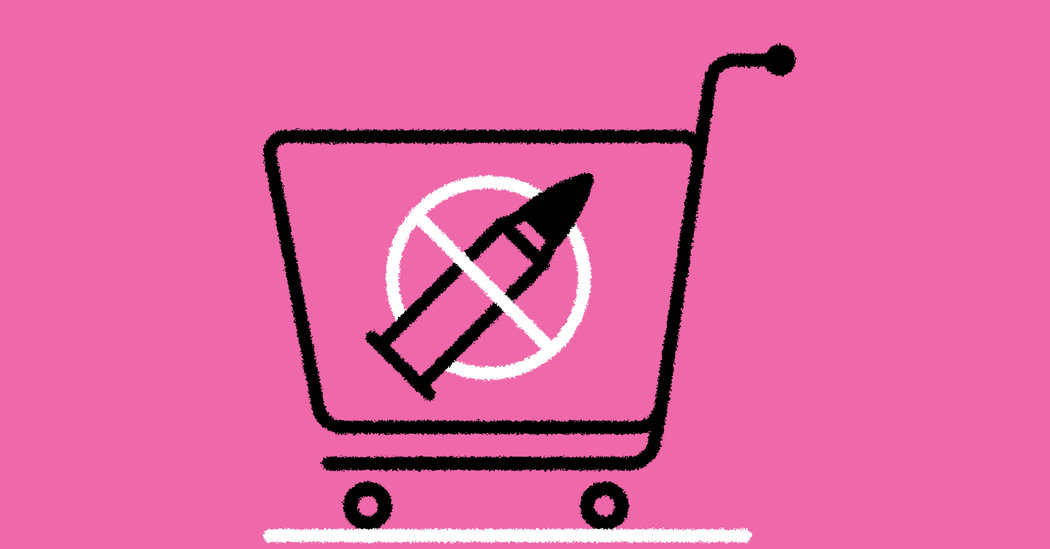Just when you thought things couldn’t get crazier with Brexit, the China trade war and online privacy issues — well, they did. Here’s a quick rundown of the biggest stories in business and tech, and what to know for the week ahead. — Charlotte Cowles

What’s Up? (Sept. 1-7)
Walmart Enters the Gun Control Debate
One month after a gunman killed 22 people in a Walmart store in Texas, the retail giant (unlike Washington lawmakers) is actually doing something about it. Doug McMillon, Walmart’s chief executive, said it would stop selling ammunition for military-style assault rifles and handguns, phase out the sale of handguns entirely and request that customers not openly carry weapons in its stores, even in states where it’s legal. He also called on the government to tighten gun regulations. Obviously, the decision has irked some customers, and will leave Walmart with a smaller share of the nation’s gun and ammunition market. Still, the company’s stock rose after the announcement. And it raises a question: What role should corporations play in the gun control debate?
YouTube’s Privacy Problem
We all know that tech companies track people’s online behavior to sell ads and make money. But here’s a twist: It’s illegal to collect the personal data of children under 13 without a parent’s consent, and the internet hasn’t exactly been checking IDs. Now Google must pay a record $170 million fine to settle charges that it knowingly harvested personal information from children watching videos on YouTube and then used it to target them with ads that were a little too age appropriate. The company promised to do better, but stopped short of admitting any wrongdoing. Critics are skeptical that the settlement will change much, especially since the fine is peanuts considering Google’s billions in ad revenue.
Dorian’s Aftermath
After devastating the Bahamas, Hurricane Dorian pummeled the Carolinas, where it caused power failures, business closings, tornadoes and general mayhem. The cost of the damage remains to be seen, but one thing is for sure: Residents shouldn’t count on much help from the government or insurance companies. The Trump administration is sitting atop tens of billions of dollars in unspent recovery money allocated to help Americans rebuild after major disasters like this one, which may explain why many Carolinians are still digging out from last year’s Hurricane Florence. And the number of Americans with flood insurance is on the decline (fewer than 15 percent of homes in floodplains have it), even as major storms become more frequent.

What’s Next? (Sept. 8-14)
Back to the Table
Markets around the world rejoiced at the news that trade talks between China and the United States would resume (again) in early October. But there’s little reason to believe that this round of negotiations will go better than before — which is to say, anywhere at all. Both countries imposed yet more tariffs on imports from each other last Sunday, and plan to raise them again in December if no deal comes about. (Picture a global game of chicken, with a lot of collateral damage.) Adding to China’s headaches: Pro-democracy protests in Hong Kong have been gumming up the city’s international airport, a major hub for Asian business travelers.
Fresh iPhones for Sale
Finally ready to relinquish your decrepit old phone? Apple will unveil your latest iPhone options at its annual event Tuesday. The new phones are rumored to be slightly thicker, more water-resistant and harder to shatter than previous versions — good news for those who’ve cut their thumbs while desperately typing on a broken screen. (Don’t worry; I was fine.) But if you decide to let your current device limp through another year or two, you’re in good company — owners are waiting longer and longer to replace their smartphones, causing sales to decline for the last few years.
If at First You Don’t Succeed, Vote, Vote Again
It’s the same old mess, but with a few new snags. Britain is hurtling toward its Oct. 31 deadline for pulling out of the European Union, but — surprise, surprise — Parliament is still divided on how to go about it. Boris Johnson, the country’s new prime minister, had a particularly rough week when lawmakers rejected his request for a snap election, which would have shored up his proposal to leave with or without an actual plan. They also passed a bill that would prohibit a no-deal Brexit, and it’s expected to become law as soon as this week. In other words, Brexit can’t happen without an agreement, but no one can agree — democracy at its finest.
What Else?
Facebook introduced its dating service, which will allow users to merge their Facebook and Instagram accounts to stalk — er, find — potential love matches. The feature also lets people make “Secret Crush” lists, so you can tag your romantic interest without anyone finding out (well, anyone besides Facebook, of course). Speaking of co-opted social media: Leaders from Facebook, Google, Twitter and Microsoft met with government officials in Silicon Valley on Wednesday to discuss measures against foreign meddling in the 2020 election. And in other news, LeBron James, a noted taco fan, is trying to trademark “Taco Tuesday” for potential future business ideas — although his spokesman confirms that others are still free to use the term.

